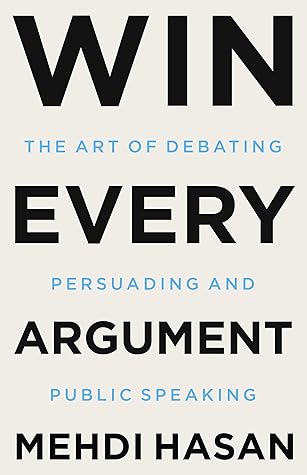More on this book
Community
Kindle Notes & Highlights
by
Mehdi Hasan
Read between
September 25 - October 4, 2023
“When eye contact is maintained, it signifies control or power over a situation and establishes dominance.”
compares confidence to a muscle in the body. You need to work on it, she told the Guardian, like you would work on any other muscle. Doing so allows you to maintain, grow, and strengthen it.
If you lose your cool during an argument, odds are you’ll lose that argument. It’s really that simple.
Instead of silently talking to ourselves in the first person, it’s more effective to do so in the third person, by using our own names.
third-person self-talk leads people to think about the self similar to how they think about others,” which allows them the “psychological distance” to keep their own emotions under control. They conclude that “third-person self-talk may constitute a relatively effortless form of self-control.”
You can take a step back and see the bigger picture. It’s rarely ever as bad as you think it is.
As Mark Twain once quipped: “It usually takes more than three weeks to prepare a good impromptu speech.”
This is one of the most important pieces of advice I can give you when it comes to public speaking: Do. Not. Wing. It.
I promise: no one wants to hear you meander through a twenty-minute story that you could have told in two.
“If you want me to give you a two-hour presentation, I am ready today. If you want only a five-minute speech, it will take me two weeks to prepare.”
“Give me six hours to chop down a tree,” Abraham Lincoln is said to have remarked, “and I will spend the first four sharpening the axe.” I firmly agree with Honest Abe.
if you want to win an argument, nothing is more important than digging in and doing your homework.
The inconvenient truth is that it doesn’t matter how clever, passionate, or eloquent you are—you cannot win an argument without putting in the work.
there are three crucial components to the preparation you’ll need to do before any argument, interview, or presentation: brainstorming, researching, and role-playing. Let’s take each in turn.
“The best way to have good ideas is to have lots of ideas and throw away the bad ones,”
When it comes to brainstorming, quantity matters more than quality. Yes, that’s right. You read that correctly. The experts say to worry about quantity first, and quality much, much later.
“Every amazing creative thing you’ve ever seen or idea you’ve ever heard can be broken down into smaller ideas that existed before,”
“Your head is filled with solutions you’ve seen, and analogies are a way of looking through that past history of solutions to say, ‘Well, maybe one of those could work here,’”
you can always phone a friend. Get a friend, colleague, or family member, even, to role-play with you before the big speech or pitch meeting. They don’t need to be a trained actor to help you become more comfortable with what you want to say. It’s all part of public speaking homework.
the simplest and surest way to lose an argument is to go into it with a set of views or opinions that you have not sufficiently challenged.
The only solution is to know both sides of the argument—not just the viewpoint you may personally favor.
your aim should be to reach a point where you know your opponent’s arguments better than they do—and where you can also spot the flaws in your own arguments before they do.
To get it right requires what is called “steelmanning”—an exercise in constructing the strongest version of your opponent’s argument. Steelmanning, as many have pointed out, is the total opposite of the infamous “strawman” argument, which involves dumbing down your opponent’s position as a way of undermining them.
What is your opponent’s best argument? What is their best evidence for that argument? Who is the best advocate for that argument? What is their best critique of your argument?
And I am convinced that every one of you would rise up and tear me down from my place if I were for one moment to contemplate parley or surrender. If this long island story of ours is to end at last, let it end only when each one of us lies choking in his own blood upon the ground.
“Then and there,” wrote historian John Lukacs in his landmark work, Five Days in London: May 1940, “he saved Britain, and Europe, and Western civilization.”
“It is only when you’re sick of hearing yourself repeat the same message over and over again that your audience is just beginning to get it”
People are of two types: they are either your brothers in faith, or your equals in humanity.
Try out these three main strategies to create a memorable ending to any speech or argument: (1) employ powerful quotes that echo the theme of your speech; (2) share a humanizing anecdote that reminds people why your argument matters; or (3) deliver a heartfelt call to action that inspires people to do something.
“They may forget what you said—but they will never forget how you made them feel.”


